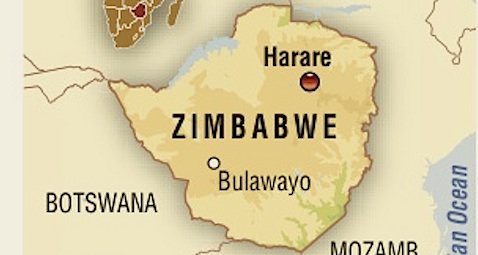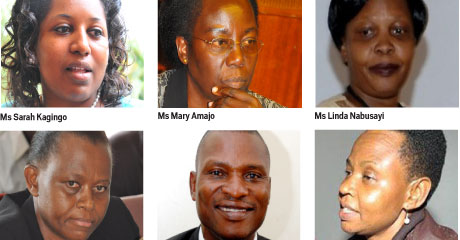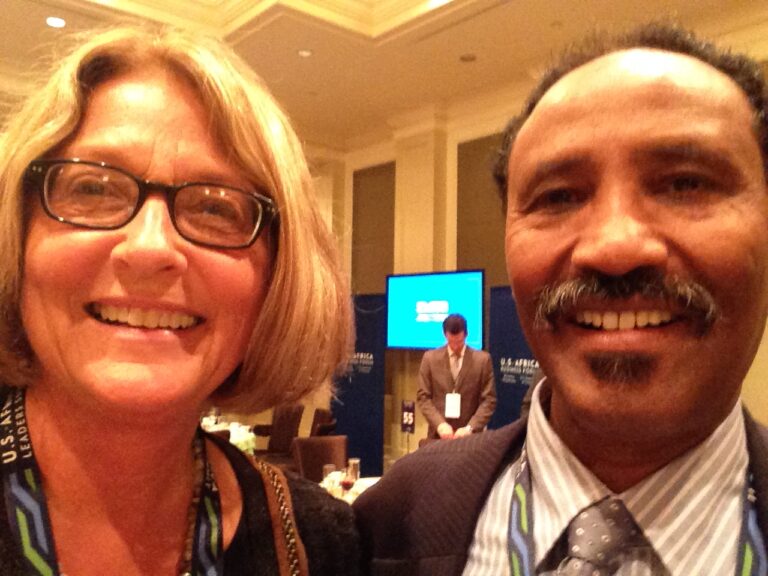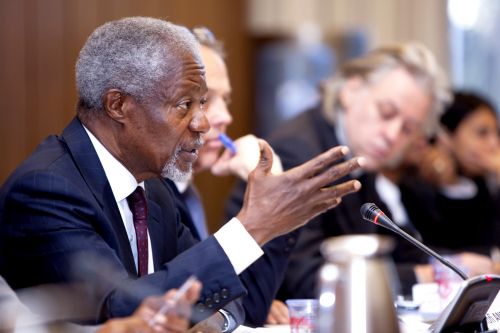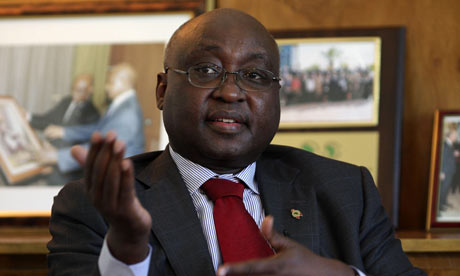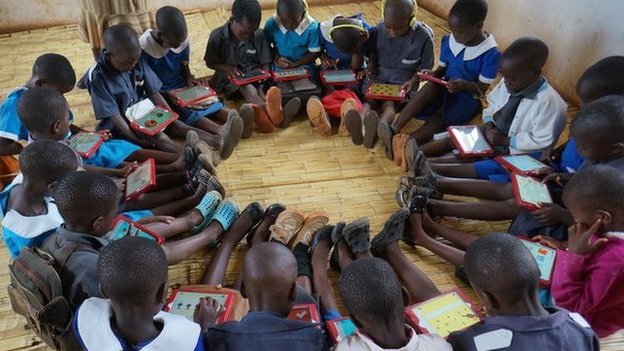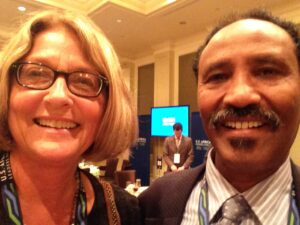Kenya's Malindi, a paradise lost
October 30, 2014
Parselelo Kantai in Malindi Photographs by Andrew Njoroge for TAR*
[caption id="attachment_13507" align="alignleft" width="710"] Security fears have kept visitors away from Malindi’s pure white beaches. Photo©Andrew Njoroge for TAR[/caption]
After three decades of mafia money and a rampant sex trade Malindi's tourist income is drying up. Will the separatists gain ground or can the town reinvent itself?
It is not exactly Florence on the Indian Ocean, but there is a distinctly Italianate imprint on Malindi – the language, the food, the hotels and the casinos, and even the occasional fugitive from justice.
For a generation, Italians in search of the African sun have travelled to Malindi. They have set up business and built hotels with mixed success.
One of the most ambitious of them is the colourful tycoon Flavio Briatore, who set up franchises for Benetton and managed the Renault Formula One team.
A string of convictions for fraud in the 1980s – later cancelled in an amnesty – proved no bar for Briatore to do business in Kenya.
At first glance Briatore's latest and most ambitious project in Malindi – Billionaire Resort, with an estimated cost of KSh500m ($5.5m) – looks deserted in late August.
Apart from a small detail at the gates, an assistant manager with a security radio at reception and a guest- relations officer who briefly struggles with English before smiling and falling silent, the place is empty.
From the closed casino to the small shopping centre, where the impossible price tags on extravagant trinkets lie behind the windows of unopened shops, to the vast empty restaurant by the beach with the silverware gleaming on immaculate tablecloths, the resort has the air of an abandoned vaudeville set.
But four guests just arrived and are coming in from the airport. Another party left a few days ago, so business is ticking over.
Manager Philip Chai says that unlike other tourist operations in Malindi, the resort does not depend on hotel guests. Of the 40 or so apartments available to buy, 26 have already sold for €1.2m ($1.5m) each.
"Mr Briatore didn't come here to build a church. This is an investment, and he expects to make a profit," says Chai, who was persuaded to come out of retirement to manage the Billionaire Resort when it opened last year.
The resort was supposed to lend Malindi a touch of glamour and encourage big-spending tourists. Some of Briatore's closest friends and associates, including Italy's former prime minister Silvio Berlusconi and Formula One superstar Fernando Alonso, attended its opening festivities.
This year, Kenya's President Uhuru Kenyatta dropped in, bestowing a kind of political endorsement for Briatore.
Land controversy
Briatore has been particular about employing local staff. Kenyan architects designed the resort, and local firm Continental Homes built it. Of the 50 employees that work at Billionaire Resort, all but a handful are locals. The food is also sourced locally.
Even before it opened, the resort sparked controversy. It abuts the Malindi Marine National Park, a protected conservation area where permanent physical development is forbidden.
The resort was extended into the park amid protests from local people and stories of a deal negotiated behind the scenes.
Chai rejects the complaints: "We had not encroached on the marine park. What happened is that the land we had was not sufficient for the development we had planned, so we requested the government, through the Kenya Wildlife Service (KWS), to lease [us] the land for a period. We got the lease for 25 years, but I think where things went wrong is that KWS failed to communicate their decision to other stakeholders."
Beach operators complain they were evicted to make way for Briatore's resort. Some claim that there was no proper environmental impact assessment.
Briatore's venture is one of the few new tourism ventures on the coast that appears to be turning a profit.
As Western governments put out travel advisories about terror attacks in Kenya, tourism has slumped, and with it Malindi's economy.
Part of what drew Briatore to Malindi was its 'Little Italy in Africa' history. It has long been a favoured playground of businessmen and pensioners, politicians and celebrities, and even notorious criminals lying low until the heat dies down in Europe.
From the boda boda taxi operator and the curio sellers on the beaches to bank tellers, property agents, sex workers and hotel managers, everybody speaks Italian.
Many street signs are in Italian. Local lawyers draw up contracts in both Italian and English. All the big hotels and nightclubs, formerly owned by Britons and Germans, are now owned by Italians.
Dangerous ecosystem
[caption id="attachment_13508" align="alignright" width="480"]
Security fears have kept visitors away from Malindi’s pure white beaches. Photo©Andrew Njoroge for TAR[/caption]
After three decades of mafia money and a rampant sex trade Malindi's tourist income is drying up. Will the separatists gain ground or can the town reinvent itself?
It is not exactly Florence on the Indian Ocean, but there is a distinctly Italianate imprint on Malindi – the language, the food, the hotels and the casinos, and even the occasional fugitive from justice.
For a generation, Italians in search of the African sun have travelled to Malindi. They have set up business and built hotels with mixed success.
One of the most ambitious of them is the colourful tycoon Flavio Briatore, who set up franchises for Benetton and managed the Renault Formula One team.
A string of convictions for fraud in the 1980s – later cancelled in an amnesty – proved no bar for Briatore to do business in Kenya.
At first glance Briatore's latest and most ambitious project in Malindi – Billionaire Resort, with an estimated cost of KSh500m ($5.5m) – looks deserted in late August.
Apart from a small detail at the gates, an assistant manager with a security radio at reception and a guest- relations officer who briefly struggles with English before smiling and falling silent, the place is empty.
From the closed casino to the small shopping centre, where the impossible price tags on extravagant trinkets lie behind the windows of unopened shops, to the vast empty restaurant by the beach with the silverware gleaming on immaculate tablecloths, the resort has the air of an abandoned vaudeville set.
But four guests just arrived and are coming in from the airport. Another party left a few days ago, so business is ticking over.
Manager Philip Chai says that unlike other tourist operations in Malindi, the resort does not depend on hotel guests. Of the 40 or so apartments available to buy, 26 have already sold for €1.2m ($1.5m) each.
"Mr Briatore didn't come here to build a church. This is an investment, and he expects to make a profit," says Chai, who was persuaded to come out of retirement to manage the Billionaire Resort when it opened last year.
The resort was supposed to lend Malindi a touch of glamour and encourage big-spending tourists. Some of Briatore's closest friends and associates, including Italy's former prime minister Silvio Berlusconi and Formula One superstar Fernando Alonso, attended its opening festivities.
This year, Kenya's President Uhuru Kenyatta dropped in, bestowing a kind of political endorsement for Briatore.
Land controversy
Briatore has been particular about employing local staff. Kenyan architects designed the resort, and local firm Continental Homes built it. Of the 50 employees that work at Billionaire Resort, all but a handful are locals. The food is also sourced locally.
Even before it opened, the resort sparked controversy. It abuts the Malindi Marine National Park, a protected conservation area where permanent physical development is forbidden.
The resort was extended into the park amid protests from local people and stories of a deal negotiated behind the scenes.
Chai rejects the complaints: "We had not encroached on the marine park. What happened is that the land we had was not sufficient for the development we had planned, so we requested the government, through the Kenya Wildlife Service (KWS), to lease [us] the land for a period. We got the lease for 25 years, but I think where things went wrong is that KWS failed to communicate their decision to other stakeholders."
Beach operators complain they were evicted to make way for Briatore's resort. Some claim that there was no proper environmental impact assessment.
Briatore's venture is one of the few new tourism ventures on the coast that appears to be turning a profit.
As Western governments put out travel advisories about terror attacks in Kenya, tourism has slumped, and with it Malindi's economy.
Part of what drew Briatore to Malindi was its 'Little Italy in Africa' history. It has long been a favoured playground of businessmen and pensioners, politicians and celebrities, and even notorious criminals lying low until the heat dies down in Europe.
From the boda boda taxi operator and the curio sellers on the beaches to bank tellers, property agents, sex workers and hotel managers, everybody speaks Italian.
Many street signs are in Italian. Local lawyers draw up contracts in both Italian and English. All the big hotels and nightclubs, formerly owned by Britons and Germans, are now owned by Italians.
Dangerous ecosystem
[caption id="attachment_13508" align="alignright" width="480"]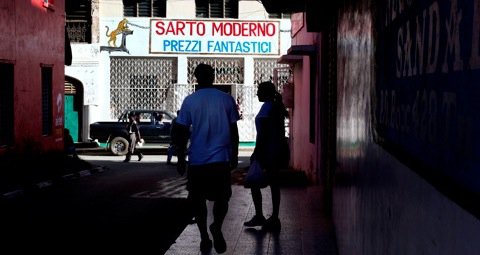 No doubt about whose euros the town depends on. Photo©Andrew Njoroge for TAR[/caption]
"Without the Italians, Malindi doesn't exist. It's as simple as that," says a Kenyan tour operator who specialises in deep-sea fishing. "You cannot survive in Malindi without speaking Italian," says a woman who moved to the town four years ago.
"The Italians are the gods of this town. These days, because the economy in their country is not so good, they are taking the place of local tour guides because they have the advantage of a direct connection with their home markets," she adds.
Tourism is now in the doldrums, and the eurozone is in a continued state of crisis. The retiree who 20 years ago collected a lump-sum pension and took a chartered flight to Malindi is now faced with a dilemma.
Returning to Italy may be out of the question. But staying in Kenya, with growing insecurity, inflation and harassment from shady immigration officials under pressure to stem the tide of illegal aliens, is getting much harder.
"Life has become very expensive for these people. You now find Italians get- ting involved in small-scale businesses – the boda boda business – and even competing with beach boys for clients on the beach," observes a senior hotel manager who has been in the business since the 1970s.
"It's very sad. The British and the Germans never got involved in the economy at this level. There should be laws limiting this kind of thing."
It was science, not tourism, that first brought Italians to Malindi. Kenya had been independent for less than three months in March 1964, when a young aeronautical engineer named Franco Esposito, dispatched by the Università di Roma, arrived in Malindi to scout for a location to build a launch pad for Italy's inaugural satellite programme.
The San Marco Project, as it came to be known, was a joint initiative of the Università di Roma, the US National Aeronautics and Space Administration and Jomo Kenyatta's government.
In 1965, Italy launched its first satellite from Formosa (now Ungwana) Bay, 28km south-west of Malindi. Almost 50 years and 12 satellite launches later, Esposito is one of the thousands of Italians who have settled in Malindi.
He has done better than most. After retiring, he started working with the people of Ngomeni, where he had set up when he first arrived. "In those days, Ngomeni was a fishing village consisting of no more than four Bajuni huts," he recalls, referring to a minority community.
Work on the launch pad brought in hundreds of Giriama recruits, the dominant community in the Malindi area, who then settled in Ngomeni.
In 2007, the Giriama elders gave Esposito a new name, Kasaso wa Baya, and urged him to run for the Magarini parliamentary seat. He lost by 100 votes but had become the first Italian to run for political office in Kenya.
Malindi is one of the poorest towns in Kenya. In Magarini constituency, one of the two constituencies in Malindi District, 78% of the population of about 50,000 lives on less than KSh1,562 a month, the poverty threshold. The education figures are just as revealing, perhaps even more so.
About half of Malindi's children are enrolled in primary school. Only 24% of the boys and 10% of the girls go on to secondary school.
Waves of colonialism
Italian migration and tourism in Malindi have created a kind of 'Dutch disease,' which has depressed other economic activities outside tourism. The chaotic and politically charged land tenure system has made it difficult for many local people to set up productive businesses.
Since Vasco da Gama, the Portuguese explorer, dropped anchor at Malindi port in 1498 and erected a pillar to commemorate the landing, it has been under the grip of one foreign power after another: the Portuguese were followed by the Omanis, the Zanzibaris and then the British.
In the early 1900s, the sultan of Zanzibar ceded the Kenyan coast to the British. The British claimed jurisdiction over a 10-mile strip of the coast that stretched from Kismayo in the north to Shimoni in the south.
At Kenya's independence in 1963, President Jomo Kenyatta's new government signed an agreement with the coastal peoples that, in exchange for jurisdiction over the old 10-mile strip, it would administer it in accordance with Swahili custom and Islamic sharia law.
Kenyatta soon reneged on the agreement and rejected old land tenure claims. The result has been a free-for-all land grab. The claims of the Giriama and Bajuni to their ancestral lands have been systematically ignored.
Unable to eke a living from the land – once the site of an Arab plantation system dependent on African slaves – the youth have exchanged their jembes (Kiswahili for hoe) for hotel beaches.
Some locals say that Somalia's Islamist insurgency and a coastal separatist group see Malindi as a base for attracting members.
"The land problem here is a powder keg waiting for someone to strike a match. And I fear that both Al- Shabaab and the [Mombasa Republican Council] are already recruiting young people here," says Vincent Karisa, a youth activist who now works for the new Kilifi County government.
Karisa's history, he says, encapsulates the crisis: "I am the third person in my village to have gone beyond high school. Everybody was illiterate – my father, my mother, the village headman – everyone. Because I went to school, I don't need a mzungu [white person]."
Among the Italians in Malindi, there are quiet dissidents. "For Italians, Malindi is a celebrity paradise. In the 1970s, when the first chartered flights from Italy started, the reputation of Malindi was the destination of the 'happy few' – the glamour crowd who wanted to be an Italian equivalent of the British 'Happy Valley set' in the Rift Valley," says an Italian resident who asks to remain anonymous.
"Lower-class types wanted to imitate them. When they retire and get their pensions, they now all flock to Malindi."
In the 1980s, Malindi's reputation as a haven for Italian fugitives and pensioners with mafia links had become a staple in the Italian media. Malindi was the sex- and-drugs destination of the Italian bad boy, helped by the absence of an extradition treaty between Kenya and Italy.
A few years ago a massive billboard was posted outside Malindi airport. It showed a picture of a little girl, her back towards the viewer, and was accompanied by the words, 'Leave me alone! I am not here for your pleasure.' The text was in Italian, a clear signal to whom the message was targeted.
Agnes Masudi, a social worker with Italian NGO Nativo, has worked for years with abused children. At the time the billboard appeared she was handling at least three cases of child sex abuse a day.
"Sometimes the girls would be as young as nine, but mostly they are teenagers between the ages of 15 and 17 years," she recalls. Old men would check into hotels with under-age girls, untroubled by the management.
Sex trafficking
Gongoni is a township on the outskirts of Malindi across the Sabaki River. It has long been known as a major source of child sex workers. A culture of early marriages in the community morphed, driven by tourism, into a child sex trafficking industry.
David Katana Masha, a community leader and chair of the board of two primary schools there, explains the human cost: "It's been going on for the past 30 years. The influence of tourism has profoundly affected children's education here. They are simply not interested in education," he says. "They are pushed into it [commercial sex] by their parents. The community is apathetic and very poor. They see it as a source of income."
After a damning UN report on the child sex industry and a campaign targeting hotels, the sex trade has diminished. "We've been very effective in curbing the abuses in public places. It used to be out in the open. Now you won't find a single hotel that allows it," says a government official.
But other officials say that the trade has simply gone underground. There are only two child protection officers in the whole of Malindi.
The combination of growing youth unemployment, the gross corruption of a semi-covert sex industry, searing inequalities between local people and the Nairobi and international elite looks combustible in Malindi.
For many along the coast, it is heading for another set-piece confrontation between Western moral depravity and the radical proselytisers that Karisa mentions. ●
*Source theafricareport]]>
No doubt about whose euros the town depends on. Photo©Andrew Njoroge for TAR[/caption]
"Without the Italians, Malindi doesn't exist. It's as simple as that," says a Kenyan tour operator who specialises in deep-sea fishing. "You cannot survive in Malindi without speaking Italian," says a woman who moved to the town four years ago.
"The Italians are the gods of this town. These days, because the economy in their country is not so good, they are taking the place of local tour guides because they have the advantage of a direct connection with their home markets," she adds.
Tourism is now in the doldrums, and the eurozone is in a continued state of crisis. The retiree who 20 years ago collected a lump-sum pension and took a chartered flight to Malindi is now faced with a dilemma.
Returning to Italy may be out of the question. But staying in Kenya, with growing insecurity, inflation and harassment from shady immigration officials under pressure to stem the tide of illegal aliens, is getting much harder.
"Life has become very expensive for these people. You now find Italians get- ting involved in small-scale businesses – the boda boda business – and even competing with beach boys for clients on the beach," observes a senior hotel manager who has been in the business since the 1970s.
"It's very sad. The British and the Germans never got involved in the economy at this level. There should be laws limiting this kind of thing."
It was science, not tourism, that first brought Italians to Malindi. Kenya had been independent for less than three months in March 1964, when a young aeronautical engineer named Franco Esposito, dispatched by the Università di Roma, arrived in Malindi to scout for a location to build a launch pad for Italy's inaugural satellite programme.
The San Marco Project, as it came to be known, was a joint initiative of the Università di Roma, the US National Aeronautics and Space Administration and Jomo Kenyatta's government.
In 1965, Italy launched its first satellite from Formosa (now Ungwana) Bay, 28km south-west of Malindi. Almost 50 years and 12 satellite launches later, Esposito is one of the thousands of Italians who have settled in Malindi.
He has done better than most. After retiring, he started working with the people of Ngomeni, where he had set up when he first arrived. "In those days, Ngomeni was a fishing village consisting of no more than four Bajuni huts," he recalls, referring to a minority community.
Work on the launch pad brought in hundreds of Giriama recruits, the dominant community in the Malindi area, who then settled in Ngomeni.
In 2007, the Giriama elders gave Esposito a new name, Kasaso wa Baya, and urged him to run for the Magarini parliamentary seat. He lost by 100 votes but had become the first Italian to run for political office in Kenya.
Malindi is one of the poorest towns in Kenya. In Magarini constituency, one of the two constituencies in Malindi District, 78% of the population of about 50,000 lives on less than KSh1,562 a month, the poverty threshold. The education figures are just as revealing, perhaps even more so.
About half of Malindi's children are enrolled in primary school. Only 24% of the boys and 10% of the girls go on to secondary school.
Waves of colonialism
Italian migration and tourism in Malindi have created a kind of 'Dutch disease,' which has depressed other economic activities outside tourism. The chaotic and politically charged land tenure system has made it difficult for many local people to set up productive businesses.
Since Vasco da Gama, the Portuguese explorer, dropped anchor at Malindi port in 1498 and erected a pillar to commemorate the landing, it has been under the grip of one foreign power after another: the Portuguese were followed by the Omanis, the Zanzibaris and then the British.
In the early 1900s, the sultan of Zanzibar ceded the Kenyan coast to the British. The British claimed jurisdiction over a 10-mile strip of the coast that stretched from Kismayo in the north to Shimoni in the south.
At Kenya's independence in 1963, President Jomo Kenyatta's new government signed an agreement with the coastal peoples that, in exchange for jurisdiction over the old 10-mile strip, it would administer it in accordance with Swahili custom and Islamic sharia law.
Kenyatta soon reneged on the agreement and rejected old land tenure claims. The result has been a free-for-all land grab. The claims of the Giriama and Bajuni to their ancestral lands have been systematically ignored.
Unable to eke a living from the land – once the site of an Arab plantation system dependent on African slaves – the youth have exchanged their jembes (Kiswahili for hoe) for hotel beaches.
Some locals say that Somalia's Islamist insurgency and a coastal separatist group see Malindi as a base for attracting members.
"The land problem here is a powder keg waiting for someone to strike a match. And I fear that both Al- Shabaab and the [Mombasa Republican Council] are already recruiting young people here," says Vincent Karisa, a youth activist who now works for the new Kilifi County government.
Karisa's history, he says, encapsulates the crisis: "I am the third person in my village to have gone beyond high school. Everybody was illiterate – my father, my mother, the village headman – everyone. Because I went to school, I don't need a mzungu [white person]."
Among the Italians in Malindi, there are quiet dissidents. "For Italians, Malindi is a celebrity paradise. In the 1970s, when the first chartered flights from Italy started, the reputation of Malindi was the destination of the 'happy few' – the glamour crowd who wanted to be an Italian equivalent of the British 'Happy Valley set' in the Rift Valley," says an Italian resident who asks to remain anonymous.
"Lower-class types wanted to imitate them. When they retire and get their pensions, they now all flock to Malindi."
In the 1980s, Malindi's reputation as a haven for Italian fugitives and pensioners with mafia links had become a staple in the Italian media. Malindi was the sex- and-drugs destination of the Italian bad boy, helped by the absence of an extradition treaty between Kenya and Italy.
A few years ago a massive billboard was posted outside Malindi airport. It showed a picture of a little girl, her back towards the viewer, and was accompanied by the words, 'Leave me alone! I am not here for your pleasure.' The text was in Italian, a clear signal to whom the message was targeted.
Agnes Masudi, a social worker with Italian NGO Nativo, has worked for years with abused children. At the time the billboard appeared she was handling at least three cases of child sex abuse a day.
"Sometimes the girls would be as young as nine, but mostly they are teenagers between the ages of 15 and 17 years," she recalls. Old men would check into hotels with under-age girls, untroubled by the management.
Sex trafficking
Gongoni is a township on the outskirts of Malindi across the Sabaki River. It has long been known as a major source of child sex workers. A culture of early marriages in the community morphed, driven by tourism, into a child sex trafficking industry.
David Katana Masha, a community leader and chair of the board of two primary schools there, explains the human cost: "It's been going on for the past 30 years. The influence of tourism has profoundly affected children's education here. They are simply not interested in education," he says. "They are pushed into it [commercial sex] by their parents. The community is apathetic and very poor. They see it as a source of income."
After a damning UN report on the child sex industry and a campaign targeting hotels, the sex trade has diminished. "We've been very effective in curbing the abuses in public places. It used to be out in the open. Now you won't find a single hotel that allows it," says a government official.
But other officials say that the trade has simply gone underground. There are only two child protection officers in the whole of Malindi.
The combination of growing youth unemployment, the gross corruption of a semi-covert sex industry, searing inequalities between local people and the Nairobi and international elite looks combustible in Malindi.
For many along the coast, it is heading for another set-piece confrontation between Western moral depravity and the radical proselytisers that Karisa mentions. ●
*Source theafricareport]]>







